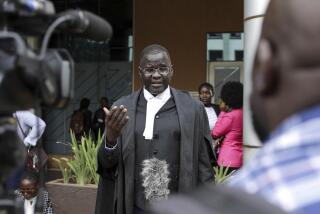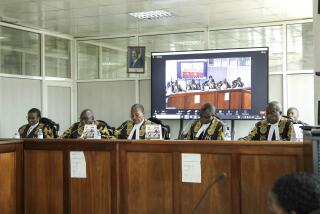Uganda anti-gay law called ‘abhorrent,’ ‘deeply offensive’
JOHANNESBURG, South Africa -- Human rights groups and Western leaders condemned harsh anti-gay legislation signed into law Monday by Uganda’s President Yoweri Museveni, calling it draconian, offensive and an affront to basic rights.
But Ugandan officials and parliamentarians, including David Bahati, who introduced the law in parliament, celebrated the move.
Bahati posted a thank you message to Museveni on his Facebook page: “If you are involved in the gay and lesbianism lifestyle you are liable to life imprisonment. Thanks to President Yoweri Museveni for protecting our families in Uganda.”
Museveni ignored intense Western pressure and appeals from President Obama and South African Nobel laureate Desmond Tutu, the former Anglican archbishop, in signing the bill into law Monday.
The White House issued a statement saying that Museveni had taken Uganda “a step backward” by signing the law, and U.S. Secretary of State John F. Kerry called it “a tragic day for Uganda and for all who care about the cause of human rights.”
Without specifying any action that the United States might take, Kerry said the U.S. was “beginning an internal review of our relationship with the Government of Uganda to ensure that all dimensions of our engagement, including assistance programs, uphold our anti-discrimination policies and principles and reflect our values.”
The White House statement said, in part: “We will continue to urge the Ugandan government to repeal this abhorrent law and to advocate for the protection of the universal human rights of LGBT persons in Uganda and around the world.”
Britain also condemned the law.
Uganda is an important U.S. ally in counter-terrorism in East Africa, with Ugandan troops playing an important role in the African Union force that has driven back the Al Qaeda-linked militia, Al Shabab, in Somalia.
But the Ugandan leader, who has been in power for nearly 28 years, has been accused by Human Rights Watch, among others, of an increasing crackdown on rights such as freedom of assembly and freedom of expression.
When Bahati originally introduced the anti-gay law in 2009, it provided the death penalty for homosexuality. Several years later that clause was dropped, but under the new law consenting gay and lesbian adults face life in prison.
According to the law, people convicted of “aggravated homosexuality” –- a crime that includes repeated acts of gay sex between consenting adults -- would face life in jail. The definition also includes gay sex involving a child or a disabled person.
The law also makes it a criminal offense not to report people suspected of being gay and may force gay and lesbian people to flee the country to avoid persecution.
Museveni summoned journalists to his official residence at Entebbe to witness the signing ceremony, at which he described homosexuality as “disgusting” and criticized what he called the West’s “social imperialism” in pressuring Uganda not to repress gay and lesbian people. He accused Western groups of arrogance and trying recruit Ugandan youth into homosexuality.
“I am not able to understand the logic of the Western culture. However, we Africans always keep our opinions to ourselves and never seek to impose our point of view on the others. If only they could let us alone,” he told journalists.
“Outsiders cannot dictate to us. This is our country. I advise friends from the West not to make this an issue, because if they make it an issue, the more they will lose. If the West does not want to work with us because of homosexuals, then we have enough space to ourselves here.”
Museveni said he had engaged Ugandan scientists to report on whether homosexuality is a purely a genetic issue and he concluded that this was not the case.
“We reject the notion that somebody can be homosexual by choice; that a man can choose to love a fellow man; that sexual orientation is a matter of choice,” Museveni said. “They should rehabilitate themselves and society should assist them to do so.”
He said he decided that society could “do something about it to discourage the trends. That is why I have agreed to sign the bill.”
In recent years, Uganda has seen a surge in anti-homosexual activity, including the outing of gay people in Ugandan tabloid newspapers, which have published the names and photographs of gay and lesbian people.
Gay activist David Kato was killed in 2011 after a tabloid newspaper published his name and photograph.
Museveni recently signed a law outlawing provocative clothing, in a move that critics said amounted to a ban on miniskirts.
Strong measures to outlaw and punish homosexuals are popular in many parts of Africa.
Amnesty International said the law “makes a mockery of the rights enshrined in the Ugandan constitution.”
“This deeply offensive piece of legislation is an affront to the human rights of all Ugandans and should never have got this far,” said Michelle Kagari, Africa deputy director at Amnesty International.
“This legislation will institutionalize hatred and discrimination against lesbian, gay, bisexual, transgender and intersex people in Uganda. Its passage into law signals a very grave episode in the nation’s history.”
Museveni “has dealt a dramatic blow to freedom [of] expression and association in Uganda by signing the anti-homosexuality bill,” said Maria Burnett, senior Africa researcher for Human Rights Watch. “Attacking basic rights and criminalizing the expression of divergent views doesn’t bode well for anyone. This is yet another troubling sign of disregard for fundamental human rights in Uganda.”
British Foreign Secretary William Hague said the law would lead to persecution of gay and lesbian people and would damage Uganda’s reputation internationally.
Tutu said the law sought to criminalize love. “There is only the grace of God. There is no scientific justification for prejudice and discrimination, ever,” Tutu said.
The Ugandan move comes after Nigerian President Goodluck Jonathan signed a similar law providing 14-year jail terms for homosexuality.
robyn.dixon@latimes.com
Twitter: @LATimesDixon
More to Read
Sign up for Essential California
The most important California stories and recommendations in your inbox every morning.
You may occasionally receive promotional content from the Los Angeles Times.










